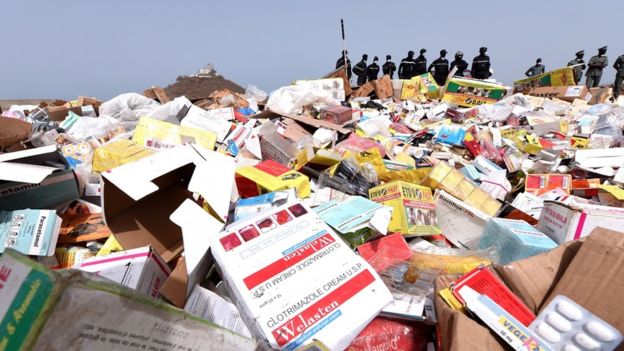| | International 
[ 2016-09-28 ] 

Counterfeit drugs: 'People are dying every day'
Imagine seeing your child suffering from malaria,
one of the biggest killers of children across the
world. Symptoms include high fever, sweating,
vomiting and convulsions.
But it's OK, you think, because you bought
medicine to combat the disease from a local drugs
market.
Now imagine what it must be like to see your child
die nonetheless because the drugs you bought were
fake.
That is the brutal reality of the multi-billion
dollar a year global trade in counterfeit drugs.
More than 120,000 people a year die in Africa as a
result of fake anti-malarial drugs alone, says the
World Health Organization, either because the
drugs were substandard or simply contained no
active ingredients at all.
Even medicines that are substandard - containing
an insufficient dosage of active ingredients, say
- can be deadly, leading to drug resistance, a
particular issue for infectious diseases like
malaria and tuberculosis.
By some estimates, about a third of all
anti-malarial drugs in sub-Saharan Africa are
fake. And these fakes can find their way into
pharmacies, clinics and street vendor stalls, or
be sold online via thousands of unregulated
websites.
But a handful of start-ups have been trying to
tackle the issue using technology.
'Simple and cheap'
Not-for-profit organisation, Sproxil, offers a
beguilingly simply solution.
Participating drugs companies apply for
scratch-panel stickers that can be attached to
their packets of drugs. Customers scratch off the
panel to reveal a code which they text to Sproxil.
The company checks the code against its database
of genuine drugs and texts back a confirmation of
authenticity.
Buyers can also scan the barcode or simply ring a
call centre staffed 24 hours a day, seven days a
week to verify that the drugs are genuine. And
Sproxil has introduced incentives for consumers to
use the service, such as mobile phone air time
rewards.
More than 70 drugs companies have signed up to the
service, including multinationals such as
GlaxoSmitKline and Novartis, says Sproxil
spokesman Tolulope Gbamolayun, and about 28
million verifications have taken place globally
since the scheme was launched in 2009.
"It's a security measure that is simple and
cheap," says Mr Gbamolayun.
In Africa, the scheme operates in Kenya, Ghana,
Nigeria, South Africa, Tanzania, and most
recently, Mali.
"But we're trying to spread our tentacles across
all the countries of Africa," he says.
Catching the fraudsters
Social entrepreneur Bright Simons set up a similar
"verify-by-mobile" system called mPedigree Network
nearly 10 years ago.
Printed barcodes and scratch-off stickers,
developed in partnership with US tech giant
Hewlett-Packard, help consumers check authenticity
against a central database.
"But you need to be able to track the product at
each stage of its journey from the factory to the
consumer," Mr Simons tells the BBC. "The consumer
app was easy to develop, but the back-end was much
more difficult."
He says mPedigree's Goldkeys product helps
manufacturers and regulators "monitor the entire
supply chain. In Nigeria, our technology has
helped regulators pinpoint where fraud is
happening and catch the fraudsters."
Bespoke software helps drugs manufacturers
register each packet of medicine in the factory
and incorporate this data into mPedigree's
database, which has now registered more than 2,000
products.
Mr Simons estimates 75 million people have
benefited as a result of fake drugs being
intercepted in Africa, and mPedigree now operates
in 12 countries across Asia and Africa.
'Invisible printing'
The pharmaceutical industry has applied a number
of other technologies to the issue, including the
use of Radio Frequency Identification (RFID)
tags.
"Our industry helps to prevent and detect fakes in
the supply chain, namely through implementation of
overt and covert technologies, including invisible
printing to be applied on the actual packages, and
forensic techniques such as hi-tech solutions that
require laboratory testing or dedicated field test
kits," says Mario Ottiglio, director of public
affairs at the International Federation of
Pharmaceutical Manufacturers and Associations
(IFPMA).
The United States Pharmacopeial Convention (USP),
a body dedicated to setting drug quality
standards, set up the Centre for Pharmaceutical
Advancement and Training (CePAT) in Accra, Ghana.
CePAT aims to train African professionals how to
screen for substandard and fake drugs, and since
2013, has helped train 190 professionals from 32
African countries, says USP chief executive Ronald
Piervincenzi.
'People are dying'
But if such tech solutions are working, why are so
many people still dying and suffering as a result
of fake medicines?
"Most of the fake drugs are made in Asia and then
imported into Africa," says Mr Simons. "The scale
of the trade is huge and what we're doing is tiny
compared to the size of the problem.
"And the very big multinational pharmaceutical
companies have been very conservative - they've
taken a long time to get on board," he says. "Tech
start-ups can't solve the problem by themselves."
Sproxil's Mr Gbamolayun agrees, saying: "We're
trying to raise awareness and spread the good news
to brand owners and customers around the world,
but we need to educate a lot more people.
"Counterfeit drugs are still a big problem -
people are dying every day."
Corruption is also to blame, says Mr Simons, with
government ministers often purloining subsidised
medicines and selling them privately at inflated
prices, and inspectors accepting bribes to turn a
blind eye to fake shipments.
"There's a black hole of accountability; we need
far more transparency throughout the whole
system," he says.
Some involved in the fight against counterfeit
drugs have also complained about the comparatively
light sentences for those prosecuted compared to
the sentences given to criminals peddling
narcotics.
"In countries with weak drug regulatory bodies
that are poorly funded and poorly staffed, and
where enforcement by the customs services and
policy agencies is also weak, counterfeiters will
continue to flourish and operate," warns IFPMA's
Mr Ottiglio.
Technology can only do so much.
Source - BBC

... go Back | |



